TikTokers have been making videos about how to steal batteries from Lime e-bikes to make upgrades to their own pedal bicycles.
Several posts on the social media app tell viewers how to remove the batteries from the popular electric bikes, available to rent out in cities across the UK, and get around their safety features.
The bikes – which are stored out on the street, around the clock – are powered by lithium-ion batteries, stored in a case glued to the frame.
Some criminals are taking the batteries to sell online – they are worth up to £300, experts have said.
Others, having stolen an expensive battery, use cheap conversion kits – not governed by safety regulations – to make their pedal bicycle electric for a low price.
Giuseppe Capanna, a product safety engineer at charity Electrical Safety First, said there is a ‘real risk’ that modified e-bike batteries could catch fire from overcharging.
He told the Times: ‘The fires are absolutely ferocious. You will have seconds to get out of the building.’
TikTok has now removed the videos since news of them emerged, saying they violated community guidelines on violence and criminality.
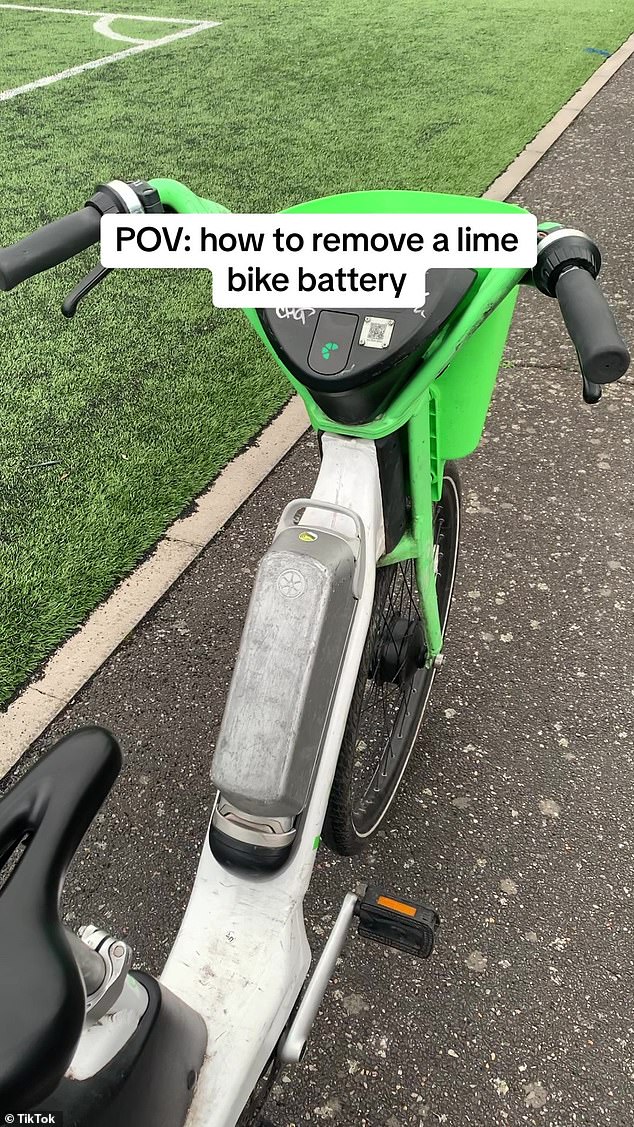
TikTokers have been making videos (pictured) about how to steal batteries from Lime e-bikes to make upgrades to their own pedal bicycles
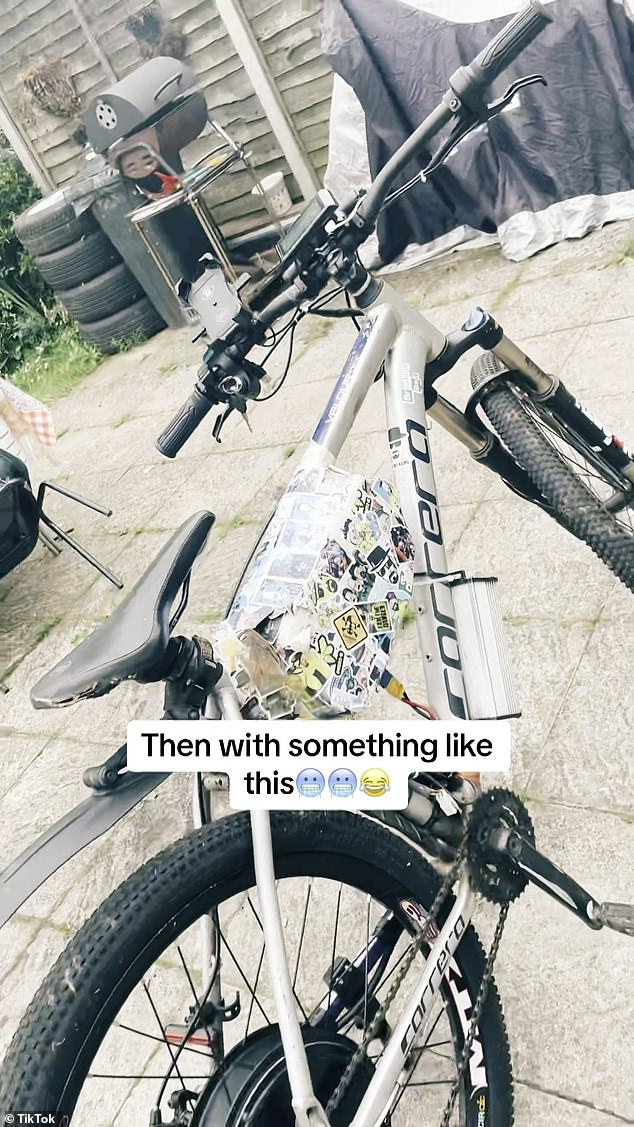
Several posts (pictured) on the social media app tell viewers how to remove the batteries from the popular electric bikes, available to rent out in cities across the UK, and get around their safety features

The bikes – which are stored out on the street, around the clock – are powered by lithium-ion batteries, stored in a case glued to the frame. Pictured: One of the videos in question
One clip shows someone making what they dubbed a ‘DIY e-bike’ using a stolen Lime battery. Alongside laughing emojis, it is captioned: ‘I hope I don’t blow up my house.’
Another video – also showing a souped-up pedal bike and racking up more than 85,000 views – saw users head to the comments section to share their own experiences of stealing Lime batteries.
One admitted they had about 40 of them – while another warned prospective battery thieves to charge them outside as they can ‘blow up easy’.
Lime, estimated to have around 30,000 rental e-bikes in London, is one of the biggest players in the sector in the capital – and has since expanded to Manchester, Nottingham, Derby and Milton Keynes.
But it is certainly not the only rental e-bike provider besieged by battery theft.
Forest, which runs across 14 of London’s 33 boroughs to Lime’s 17, saw around ten battery thefts every month last year.
This comes despite them installing a ‘thick glue which forms a cake-like substance’ around the battery case to stop people getting into it.
Swedish company Voi – which runs in more than 100 locations across Europe, nearly 20 of which are in the UK – said more than 700 batteries were stolen from their e-scooters in Liverpool two years ago.
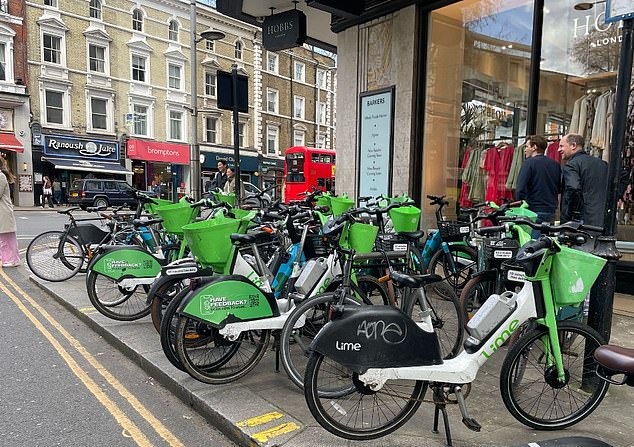
Some criminals are taking the batteries to sell online – they are worth up to £300, experts have said. Pictured: File photo
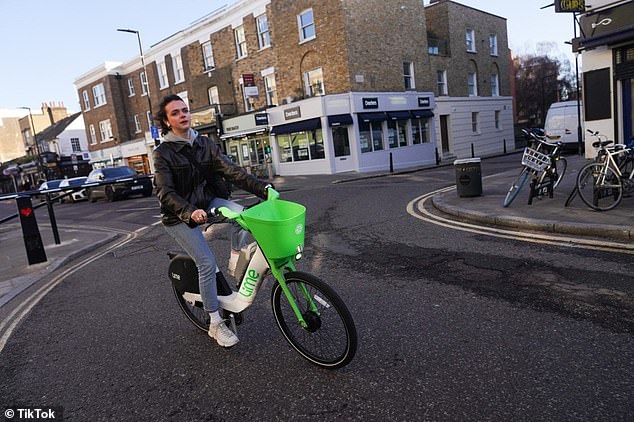
Others, having stolen an expensive battery, use cheap conversion kits – not governed by safety regulations – to make their pedal bicycle electric for a low price. Pictured: File photo
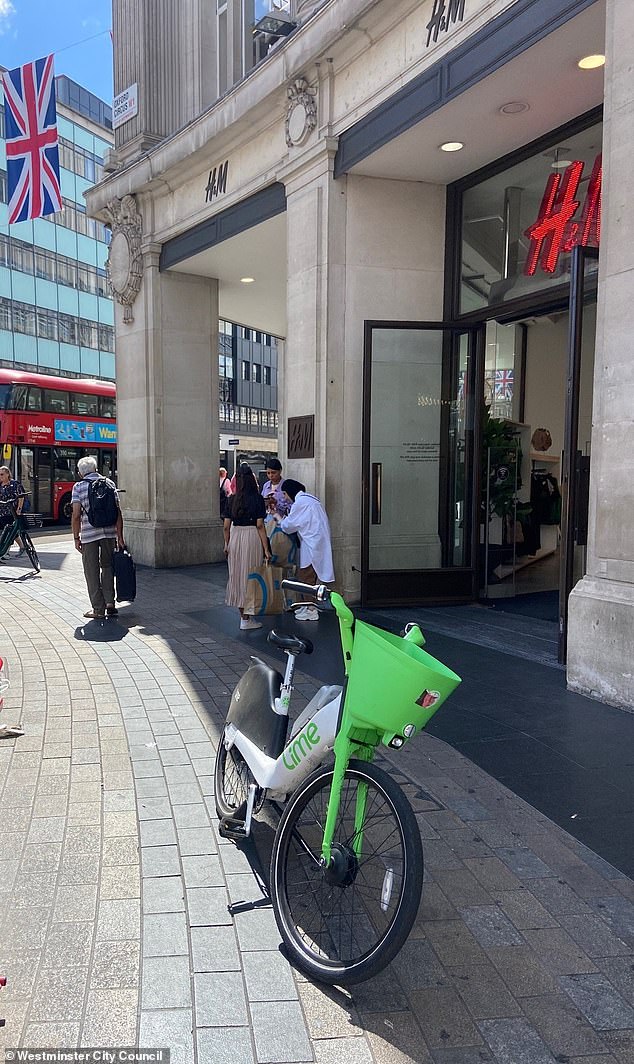
Giuseppe Capanna, a product safety engineer at charity Electrical Safety First, said there is a ‘real risk’ that modified e-bike batteries could catch fire from overcharging. Pictured: File photo of a Lime bike in Oxford Circus, central London
It cost the business more than £500,000.
But the industry would be even harder hit by mass theft of e-bike batteries, often more expensive and more powerful than those in e-scooters like Voi’s.
Ben Hubbard, who edits Zag Daily, which reports on sustainable mobility, said theft of ‘highly valuable’ batteries has become ‘a much more organised and calculated challenge’ for all UK rental e-bike operators in recent years.
Reports of battery theft need to be followed through and lead to convictions, he added, to stop people thinking it is a ‘free-for-all’.
Campaigners want e-bike batteries and conversion kits to be more regulated – while the London Fire Brigade has said people should not buy secondhand batteries.
It comes after MailOnline revealed as many as 300 Lime bikes are being illegally hacked in London every week.
Tens of thousands of young Londoners are thought to have worked out how to take a Lime without registering or paying – which is known as ‘hacking’.
Lime own and operate most of the estimated 30,000 bikes now in London, and with as many as one per cent of these having been hacked at any one time, that means up to 300 vehicles have been rogue on the city’s streets.
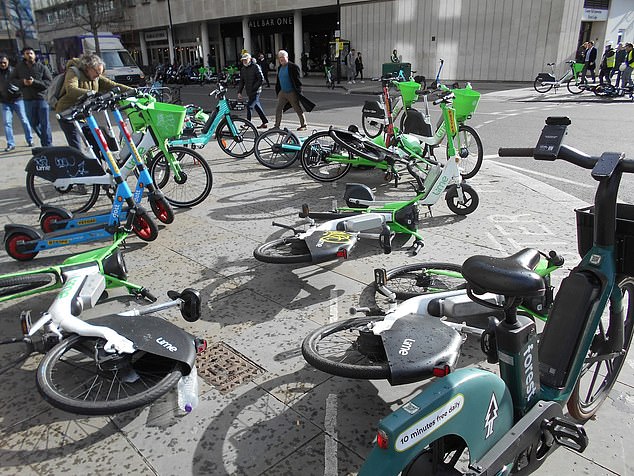
A gallery of recent images assembled by MailOnline shows how frequently the branded e-bikes have been dumped in locations that make them a menace for pedestrians or a danger to motorists

Many of the dumped bikes, left strewn across cities across the country, are thought to have been hacked

One user posted on X an image of a Lime bike abandoned in the Leg of Mutton Pond in Bushy Park, Richmond, London
Hacked bikes are effectively stolen from the company – meaning it has no knowledge of who is using them and no control over where they end up being left.
A gallery of recent images assembled by MailOnline shows how frequently the e-bikes have been dumped in locations that make them a menace for pedestrians or a danger to motorists.
Many of the dumped bikes, left strewn across our capital’s pavements, are thought to have been hacked.
While the company fines users who park in an unacceptable way, it has no control over hacker riders, who face no such disincentive.
The bikes work using an app and cost a flat fee to unlock and then a further amount based on how long they are ridden for.
But as they are ‘dockless’, riders can register, pay and unlock a bike and ride off to their destination – where although Lime encourages them to use designated bays or park responsibly, many do not follow this advice.
According to Lime more than four million Londoners have chosen their bikes since they were launched in 2018, and 16million commuting journeys were made on them last year alone.
Half of Londoners aged 18-34 use the bikes on a weekly basis.
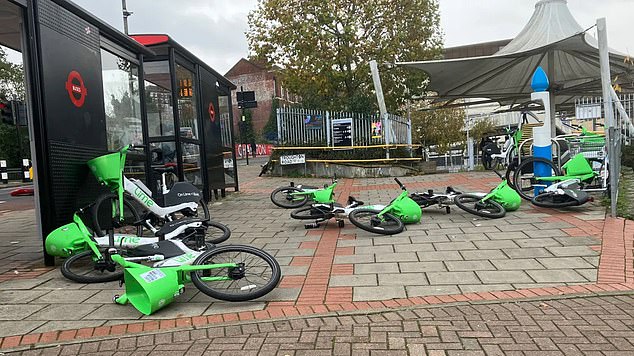
Lime bikes lie scattered chaotically across the pavement in Charlton, London with no thought for pedestrians, wheelchair users or parents with prams
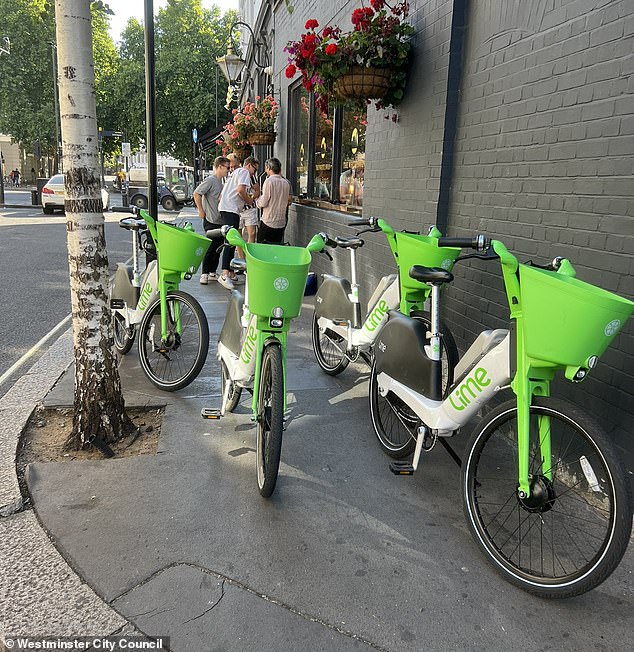
Lime bikes completely block the pavement, in a shocking image posted by Westminster City Council
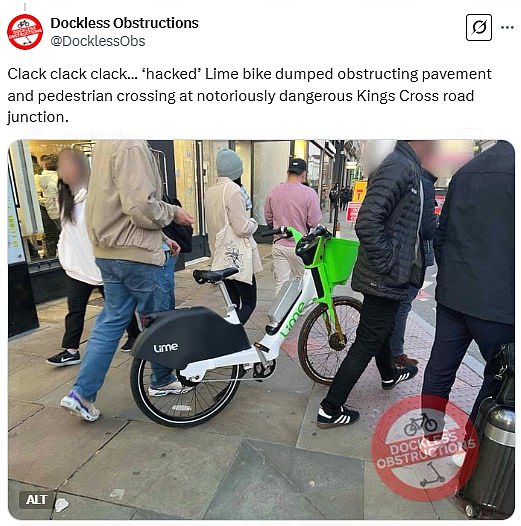
While the company fines users who park in an unacceptable way, it has no control over hacker riders, who face no such disincentive. Pictured: An X post about a ‘hacked’ Lime bike dumped in Kings Cross, London
A spokesperson for Lime said: ‘Stolen batteries account for only a small fraction of our total inventory, and we have no evidence of our batteries being used to power personal bikes.
‘We strongly condemn any criminal behaviour and report any known instances of battery theft to the police.’
Previously, they said: ‘Antisocial behaviour is rare and hacked trips now account for 1% of total trips.
‘We are committed to addressing any instances of antisocial behaviour, as this is not how we intend our service to be used.
‘While most users ride responsibly, we encourage the public to report any instances of antisocial behaviour to us, including the location and time, so we can investigate and take appropriate measures.’
The Department for Transport and Transport for London referred MailOnline to local councils when asked what was being done to keep pavements clear of e-bikes.
A Department for Transport spokesman said: ‘Local authorities already have powers to remove e-cycles from pavements where they are causing an obstruction and are responsible for working with rental operators to keep pavements clear where possible.’
Lime and TikTok were contacted for comment.











